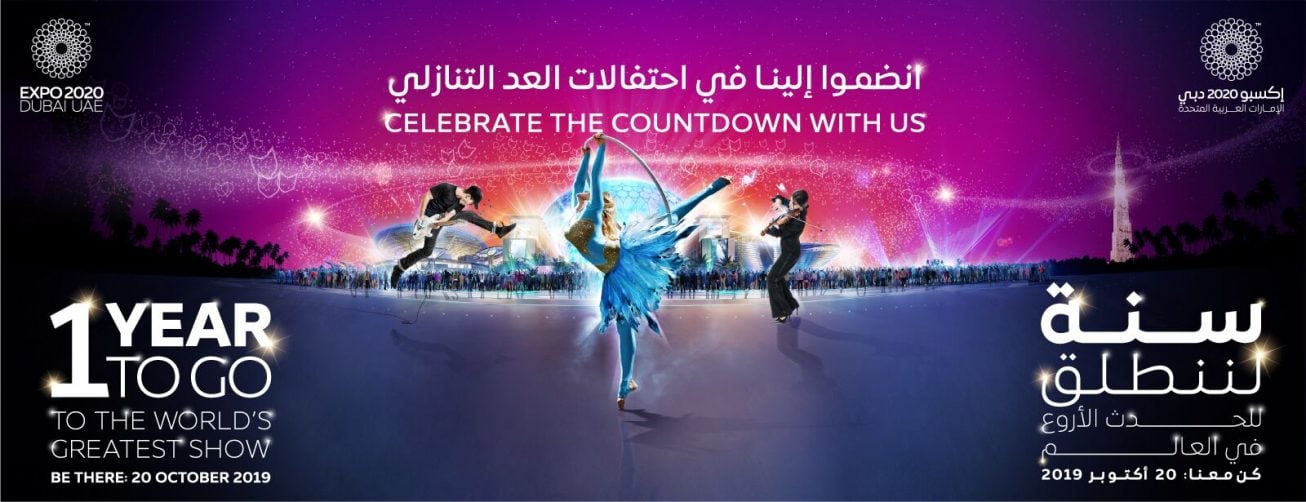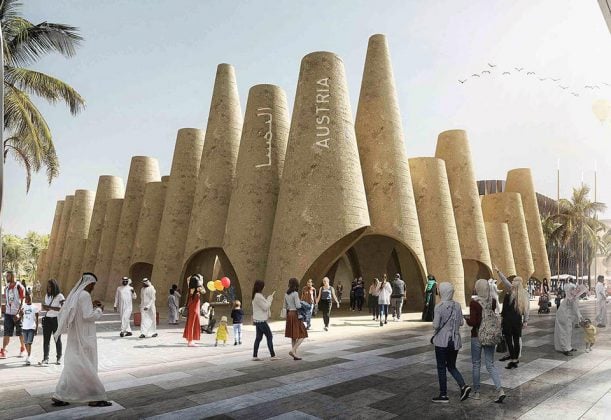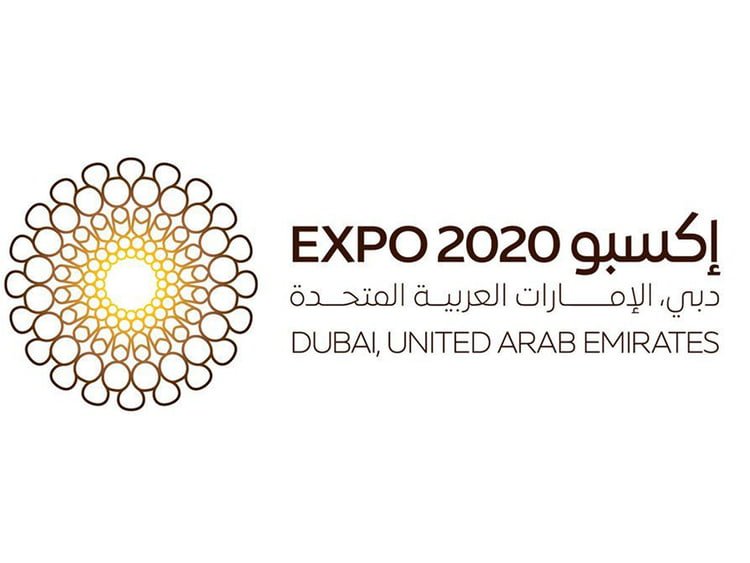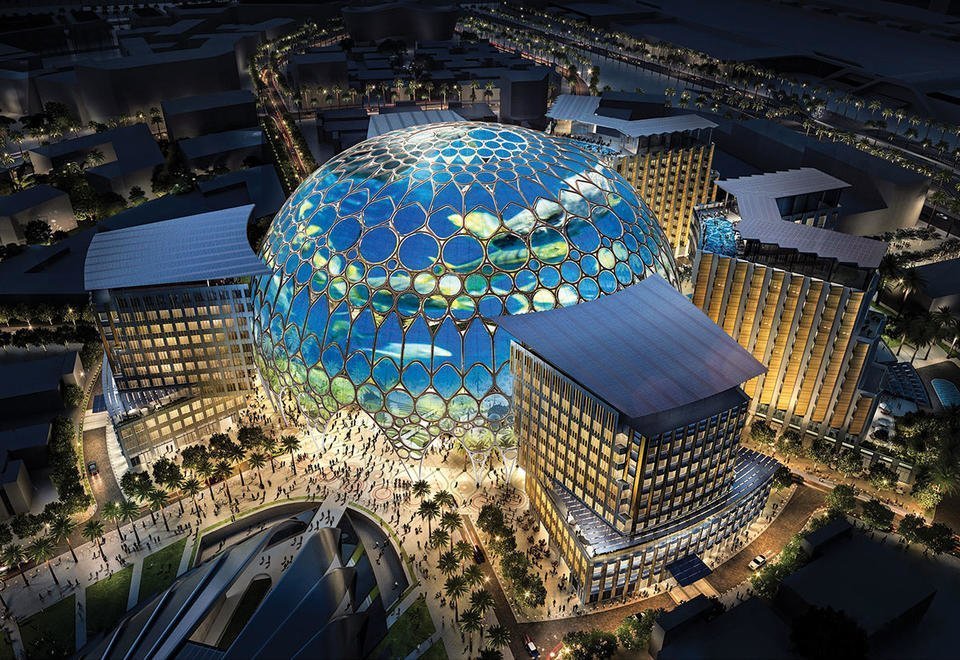Dr. Mehmood Ul Hassan Khan
Expo 2020 will be held in Dubai next year. Its final preparations are in full swing. Most recent its official countdown has been celebrated in the UAE. The first World Expo to be held in the Middle East, Africa and South Asia will take place in Dubai. The UAE has the largest pavilion in the EXPO 2020.
It starts in October 2020 and ends in April 2021, and for six months the mammoth event will celebrate culture and collaboration through innovative projects and exhibitions. A total of 192 countries will rigorously participate with millions of visitors expected to attend it from around the world. It is expected that total impact of Expo 2020 would be equivalent to 1.5 to 2 percent of the UAE’s GDP.
Expo 2020 Dubai is pursued by the belief that innovation and progress are the result of people and ideas combining in new ways. For six months from 20 October 2020, Expo will bring together 192 countries and millions of people to celebrate human ingenuity: ‘Connecting Minds, Creating the Future’.
EXPO 2020 is the “vivid reflection” of the UAE’s “futuristic” policies and programs. It is based on its “strategic planning/marketing” mainly, further diversification of macro-economy, rise to non-oil sector, greater economic stability and sustainability. It showcases its unique cultural potential. It is holistic and humanistic too. It will promote elements of Artificial Intelligence (AI) in the economy and society of the UAE.
It is expected that during the six months from 20 October 2020 to 10 April 2021, UAE will expect to welcome “25 million visits”. Moreover, About 70 per cent of all visitors will anticipate coming from outside the UAE the “largest proportion of international visitors” in Expo history of 168 years. It aims to create and deliver an inclusive and global Expo with more than 200 participants, including nations, multilateral organisations, businesses and educational institutions.
EXPO 2020 also has an “ambitious” volunteer program, which aims to include more than 30,000 volunteers from a wide range of ages, nationalities, cultures and backgrounds. The Expo site covers a total of 4.38 sqkm, including a 2 sqkm gated area. It is located adjacent to Al Maktoum International Airport in Dubai South. The six-month event is a long-term investment for the UAE, and is expected to significantly impact the country’s economy.
There are three main sub-themes to the event: “Opportunity, Mobility and Sustainability”. These will take pride of place within three stunning UAE pavilions, but will also be found in other nations’ pavilions.
It has introduced new “concepts of regional connectivity” and of course “international engagement”. It has showcased new methods of “cultural diplomacy” and “soft image” projection. Last but not least, it has institutionalized new ways and means of diversification of economy and of course UAE is the icon of economic diversification and de-carbonization in the GCC and MENA.
From ancient times to modern market places, human interaction always generates an economic activity. From coin to bit-coin and from trade of slavery to start-up chains/ services and last but not the least, from caravans of silk route to modern virtual super expressways, fairs, exhibitions and expos always stimulate trade, travel and tourism around the globe and the UAE has now become one the “hottest destinations” of regional as well as international tourists. It encourages regional as well as international peace, stability and harmony through greater regional socio-economic integration, investments and business activities.

It protects “multiculturalism” which is the essence of globalization 3 and of course the UAE has become one of the ideal countries of tolerance, multiculturalism, cultural diversity because more than 150 different nationalities live peacefully since its inception. It gears associated sectors of national economy in the country. So, EXPO 2020 would be a “game changer” in the UAE and especially for Dubai which has been successfully transformed into hub of “financial cooperation”, international seminars, conferences and fairs.
Being prominent regional expert on the UAE/GCC, I hope that Expo 2020 Dubai will definitely support its macro-economy and further strengthen its drive of “economic diversification”. It is hoped that Dubai will be benefitted from its dividends even after the Expo, leaving a “sustainable economic legacy” that will help ensure the UAE remains a leading destination for business, leisure, hospitality, human comfort, foreign direct investments, re-export center and one of the ideal destinations of multiculturalism in the region as well as in the world.

The World EXPO’s idea dates back to the Great Exhibition in London almost 168 years ago, when the UK wanted to boast of its cultural and industrial prowess, alongside 44 other countries. These days the events are held on a grander scale, but the underlying narrative is not so different. Next year it will be Dubai’s turn to host the event, the first time it has been held in the Middle East and marking a break from the usual run of European, North American and Asian hosts.
The Emirates Dubai has “big ambitions” for the event, which it is holding under the theme of “connecting minds, creating the future”. It is expected to attract more than 25 million visits to the Expo over the six months it’s on, from October 2020 to April 2021. That’s around 145,000 visits for every one of the 173 days the site is open. The organisers say most visits will be by people living outside the country, they are expecting 11 million visits by people living in the UAE and 14 million from overseas visitors.
192 national pavilions for countries from Algeria to Yemen are designed by star architects such as Foster + Partners, Grimshaw Architects and Santiago Calatrava. There will also be a program of live events every day and 200+ food outlets.
EXPO 2020 provides large financial opportunities to Dubai and the UAE alike. According to UAE’s official figures EXPO 2020 will provide an AED122.6bn ($33.4bn) boost to the local economy and support the equivalent of 49700 full-time jobs a year. The pre-Expo period is expected to deliver some AED37.7bn of gross value add (GVA) to the UAE economy, mostly from construction activity. While the Expo is being held, a further AED22.7bn in GVA is predicted, coming predominantly from spending on hotels and hospitality and business services. Finally, as much as AED62.2bn in GVA is anticipated in the decade after the Expo ends, as the legacy infrastructure starts to pay its way.

Of the overall AED122.6bn figure, some AED53.5bn is expected to come directly as a result of spending on the event and the legacy infrastructure. The rest will come indirectly, as a result of more distant economic activity further up the supply chain and in the wider economy. Moreover, London-based Capital Economics (2019) has predicted that economic growth in Dubai should range between 3.8 percent and 4.5 percent over the next few years, helped by a boost from the Expo.
The organisers say that 80 percent of the Expo’s buildings and structures will be incorporated into a new business zone called District 2020. The “UAE Opportunity Pavilion” explores its ability to shape the future. It is made from organic materials such as timber, stone and woven rope, and has been designed to inspire empathy, encouraging a desire to better the world through interactive elements that are incorporated throughout. Moreover, visitors will be challenged to think about issues based on mankind’s most basic needs: water, food and energy, for example.
“UAE Mobility Pavilion” will interact how people, goods, ideas and data move and what all that means. It has been designed by architects Foster + Partners, and takes visitors on a journey through time, from the House of Wisdom in ninth-century Iraq, to a futuristic world of artificial intelligence and virtual reality. Finally, there’s the Terra Sustainability Pavilion. The eye-opening experience takes you through forests, oceans and Earth’s corrupted wonders in a series of interactive exhibitions and elements.
Every participating nation will have a pavilion, each with its own agenda. For instance, New Zealand’s will be based in the “Sustainability District”, and will focus on the theme of “Care for People and Place”. It reflects the Maori value of “kaitiakitanga”, which emphasises the connection between humans and their environment. Its architecture illustrates “waka taonga”, the Maori tradition of using handcrafted containers to keep valuable items safe. Overall, visitors will experience an introduction to the nation’s culture, values, cuisine and design, and will also be able to check out a dedicated restaurant and store.
Over in the Opportunity District, the 13,000 square metre Saudi Arabian pavilion stands as the second largest in the entire expo after the UAE’s. Its theme is “the sky is the limit”, and the architecture resembles a large window that shoots up from the ground and soars into the sky. This is intended to symbolise the nation’s welcoming character. Visitors are shown the country’s transformation and how it has balanced its heritage with natural wonders, and will showcase the creativity of its population.
The France Pavilion will be based in the Mobility District. The theme is “Lights”, Lights and the structure will feature a layer of colourful solar panels inspired by Claude Monet’s Water Lilies oil paintings. It has been built to showcase France’s rich culture and the nation’s move towards sustainability, exploring light as an enabler of progress, as well as a source for heat and creativity, all in connection with the Age of Enlightenment. There will also be a store and bistro, with a French-style terrace, and four gardens containing plant species that can be found in France, such as olive trees, yuccas and oleanders.
Outside of the pavilions, there will be plenty of other experiences for visitors to explore. The world’s biggest 360-degree projection surface will be found on Al Wasl Plaza’s steel dome, while more than 200 food and beverage outlets will be offering everything from street food to haute cuisine and sustainable dining options. A rotating observation tower will allow guests a bird’s-eye view of the expo, while an abundance of Ghaf trees will provide shade across the site, alongside art installations by local and international artists.
There will always be something going on, as a jam-packed program has been drawn up. It includes live performances by comedians, dancers, acrobats, poets and roaming entertainers, as well as fashion shows, educational workshops and plenty of panel discussions and talks. Wellness and fitness activities include everything from mindfulness sessions to extreme sports and virtual reality experiences.
There will be a whole schedule of cultural activities, too, as every day the spotlight turns to one of the 192 participating nations, allowing each country to showcase their own quirks; one day visitors might sample a Finnish feast, while the next could see them experiencing traditional dances from Africa. In the evenings, fireworks and concerts have been scheduled to keep people busy until the early hours. Celebratory occasions that take place during Expo 2020, such as Christmas and Diwali, will also be marked with special events.
Being prominent regional expert of UAE/GCC I expect that there will be huge impact on its event management, services, construction, transport, storage, communication and retail sector from the EXPO 2020 because it is a long term investment in the future of the UAE. It is expected to contribute AED 122.6 billion to the national economy, as well as supporting small businesses, boosting the job market and fostering innovation for years to come. It is also a catalyst for economic, cultural and social transformation and generates important legacies for the host city and nation. Dubai and the UAE became a candidate city of the bid process to host World Expo 2020 in November 2011.
Moreover, the EXPO 2020 is also expected to generate as many as 905200 full-time equivalent (FTE) job-years in the UAE between 2013 and 2031, approximately the equivalent of 49,700 FTE jobs each year in the same period. The figure does not include the estimated 30,000 volunteers.
The economic benefits to Dubai from Expo will come in several phases: pre-Expo, during-Expo, and the legacy phase, each of which will generate jobs and economic activities of various kinds.
In the pre-Expo phase – which spans from 2013 until the beginning of the event begins in October 2020 – the key economic impact has come from the employment generated by on-site construction and associated jobs and spending. Of the period’s total gross-value added (GVA) to GDP of $10.3bn, 68 percent is expected to be felt in the construction sector, with another 20 of spending, roughly equal to $1.28bn, directed towards Dubai’s SME sector.
During the six months of the event between October 2020 and April 2021, an additional $6.2bn is expected to be added to GDP, primarily stemming from the visitor expenditure. On-site visitor spending includes items such as entry tickets, as well as purchases of food and beverages, while off-site spending items includes flights to and from Dubai, hotel stays, retail and local transportation.
It is predicted that its economic dividends will be felt in the decade after the event itself. During this period which will run from May 2021 to December 2031 the Expo site will be reborn as District 2020, which will include a variety of tenant companies and an expanded Dubai Exhibition Centre.
The coming event is like a catalyst for real estate development activity in the Dubai and the whole UAE. It is a festival of human ingenuity. Expo is a global destination for millions of people who would like to have an eye on the development of human creativity over the years.
EXPO 2020 Dubai will become a new stage in the development of international relations. New doors to the markets of many countries will open. First of all, effective trading channels to the markets of Asia and Africa will be established, which will enable to increase volume of re-export and export.
The United Arab Emirates have always been supporters of peace and stability in the Middle East region. State policy is aimed at maintaining tolerance and human rights protection. The world Exhibition will be a perfect ground to continue to promote mutual understanding between nations and strengthen peaceful relations. Holding the international exhibition will be a real possibility for the world to achieve common progress and strengthen global economy.
Dubai is synonymous for superior tourism, exceptional hospitality, and retail offerings. Expo 2020 Dubai will help the world see how much more we have to offer. The Expo 2020 journey became official on 27th November 2013, when Dubai won the rights to host amidst cheers, jubilations and fireworks. A National Holiday was declared for all educational institutions across the country the following day. It aims at leaving a meaningful and lasting legacy that would last for generations by the time the Expo is officially over.


